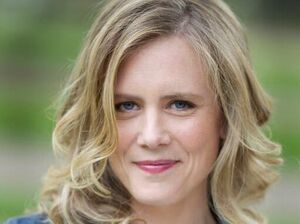Back when I was drinking, I loved the holiday season, because it was a time of year when getting blasted was perfectly acceptable.
Eat, drink and be merry? Hey, I'm just following the rules here.
Between open bars, champagne toasts and office parties, the month of December was one long pub crawl for me, and if I drank too much — and I always drank too much — I could absolve myself on Jan. 1, when I swore to a bunch of resolutions I would inevitably break about two weeks later.
I've made so many false promises on New Year's Day, you'd think I was running for office.

Sarah Hepola is the author of Blackout: Remembering the Things I Drank to Forget.
But six years ago, my party wagon came to a halt. I was tired of embarrassing myself, tired of hangovers. I was 35 years old when I got sober. And though I knew a few things, one question completely flummoxed me: How do you get through the holidays without drinking?
I had no idea how to be around people — cheery people, people with toothy smiles, who asked annoying questions like "How's it going?" — without drinking. Alcohol was the way I quieted my social anxiety, which basically came down to two issues: My problems with me, and my problems with you.
Drinking was like a quick phone-booth change into the charming extrovert the party demanded. Although as time dragged on, the transformation became a little less heroic, and a little more Jekyll to Hyde, which is why I had to give it up. And showing up to the party as me — cranky me, awkward me — made me feel so raw and exposed.
In those first shaky months, I would stand at a party, piling my plate with cheese cubes and wondering what to say if someone asked why I wasn't drinking, or worse, tried to twist my arm. Come on, one drink won't kill you. Don't be a buzzkill.
I knew a woman who said she was pregnant just to avoid that entire conversation. It's kind of messed up, but we do what we have to do. I crammed my face with squares of medium cheddar, and some people invent hysterical pregnancies.
Our culture doesn't make it easy on nondrinkers. Alcohol is the socially accepted way of bonding and easing the stress of our lives. We respond to both depression and jubilation by reaching for a drink, especially in these dark winter months.
What nobody mentions about all the holiday spirit is how much booze it requires. Stepping out of that social script can leave you feeling exiled and lonely, like you haven't just lost your crutch but you've also lost your cool card. Even people who pride themselves on their tolerance can be dismissive of people who don't drink, like they're no fun to have around — as if they're the ones peeing in the potted plants at 2 a.m.
I've been surprised over the years by how little consideration is given to the nondrinking guests. They're often a total afterthought. It's like: Here we have an artisanal cocktail with muddled mint and cinnamon-infused bourbon. Oh, wait, you don't drink? Umm, I think there's some Diet Coke in the fridge, and you can just grab a red Solo cup.
To be a good host means to consider the needs of your guests: It's normal these days to offer dinner options that are gluten-free, dairy-free or meat-free. I don't see why drinks should be any different. A simple Google search will take you to about a hundred different recipes for mocktails. And if that's too much effort, some sparkling water will go a long way. And, it's nice to offer those drinks in the same glasses you use for other guests. Downgrading the sober folk to plasticware while everyone else gets crystal goblets is such a weird punishment: As if not drinking weren't difficult enough, now I have to use a cup that announces my difference.
What I wanted, more than anything, was to belong. That's what I wanted from alcohol in the first place, and it's what I was desperate for in the months after I quit. I also wanted to believe that people still liked my company, which was tough at first, because I really didn't like my own.
But in time, I got used to this new world, and more accepting of myself. I still go to holiday parties, although I tend to arrive early and leave when everyone starts talking really loudly, but I don't struggle with that sense of radioactive weirdness anymore. I feel at home in my body, and in the world, in a way I did not for many years.
So if you're struggling to stay sober, hang in there. Because that feeling of comfort — of no longer being wracked by shame for who you are or what you did — is a gift the bottle can never give you. But it is a gift you can give yourself.
Sarah Hepola is the author of Blackout: Remembering the Things I Drank to Forget.
9(MDAxODcyMTgzMDEyMTgxMTY5NjYxN2I4OQ004))
300x250 Ad
300x250 Ad
